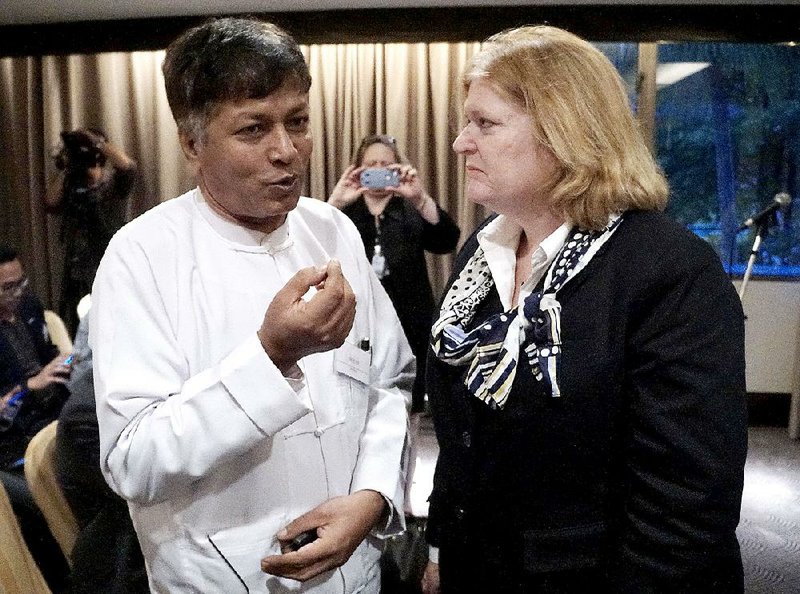BANGKOK -- A international meeting Friday to address the continuing exodus of refugees from Burma and Bangladesh ended with a commitment by the participants to target the root causes of the crisis and an ambitious plan of assistance for the impoverished and strife-torn native areas of would-be emigrants.
Without mentioning the specific areas or the people who would be helped, delegates from more than 17 governments agreed to create job incentives, provide skills training and enhance "a sense of security and belonging."
So far this year, an estimated 25,000 people have left Bangladesh and Burma on boats -- double the number last year -- and several hundred are believed to have died at sea. The largest number fleeing are Rohingya, members of a stateless and persecuted Muslim group living both in Burma and Bangladesh.
A statement issued after the one-day meeting by its host, Thailand, called for "full respect for human rights and adequate access of people to basic rights and services such as housing, education and health care."
The deputy U.S. secretary of state, Antony Blinken, who visited Burma this month and discussed the refugee crisis with officials there, said later Friday that the very fact that the meeting had occurred was an "important step forward."
"There is something to be hopeful for in the meeting today and in the commitment to greater cooperation," he said in a Skype interview from Washington. But he also warned that a deeply entrenched resentment of the Rohingya within Burma would need to be overcome. "Overall, there is a reluctance to accept the legitimacy of their presence," he said.
There appeared to be other reasons to be skeptical of the meeting's list of recommendations. U Zaw Htay, a deputy director general of the office of the president of Burma, said his country could "accept the statement in a general sense," but he called it a proposal.
"Our delegation will report back to us, and then we will decide on the implementation of the proposal," he said by telephone from Naypyidaw, the capital of Burma.
Underlining the difficulties of dealing with the crisis, Burma reported Friday that a boat carrying 727 people, including 45 children, had been stopped by the country's naval forces that morning in waters off Burma and taken to a naval base. The passengers were described by the authorities in Burma as Bengali, a term that made it impossible to know whether they were from Burma or Bangladesh.
Norachit Sinhaseni, the permanent secretary of Thailand's Ministry of Foreign Affairs, described efforts to develop areas the Rohingya are fleeing as long-term goals.
"If you expect one meeting to resolve it, I think you are expecting a miracle," he said. "And I am not one who believes in miracles."
The meeting's recommendations also seemed at odds with some of the day's proceedings, including Burma's forceful rejection of assertions by the United Nations that the root cause of the crisis was the country's treatment of the Rohingya.
The head of Burma's delegation said his government should not be singled out for the refugee crisis, that its policies toward the Rohingya were "domestic jurisdiction" and that outsiders were misinformed about what was motivating the Rohingya to leave.
U Htin Lynn, Burma's representative at the meeting, said the United Nations was wrong in its assessment of the problem.
"They need to be more informed," he said. "This issue of illegal immigration of boat people, you cannot single out my country."
Htin Lynn was responding to opening comments to the delegates by Volker Tuerk, a representative from the Office of the U.N. High Commissioner for Refugees. Tuerk said Burma should remove restrictions on the movement of the Rohingya within Burma and offer "basic freedoms" to stabilize their lives.
More than 100,000 Rohingya in Burma live in camps, having been chased from their homes by mobs of radical Buddhists over the past three years. Tuerk said the government should facilitate the return of the Rohingya to their homes.
"Granting of citizenship is the ultimate goal," he said. "Recognizing that Myanmar is their own country is urgently required."
Burma is often called Myanmar, a name that ruling military authorities adopted in 1989.
The Rohingya in Burma number more than 1 million and are widely reviled in the country, where anti-Muslim feelings run strong among the majority Buddhist population.
The government rejects the term "Rohingya"; Burmese officials had threatened to boycott the meeting Friday if the term was used.
The Rohingya are denied citizenship by Burma and are described by the government as interlopers from Bangladesh despite the fact that they were allowed to vote in Burma in 2008 and 2010 and that many if not most were born there.
The resentment toward the Rohingya, who speak a language related to those spoken in Bangladesh and are darker-skinned than most Burmese, appears to be grounded in the notion that they came during British colonial times or more recently and that they do not belong.
Information for this article was contributed by Wai Moe of The New York Times.
A Section on 05/30/2015

